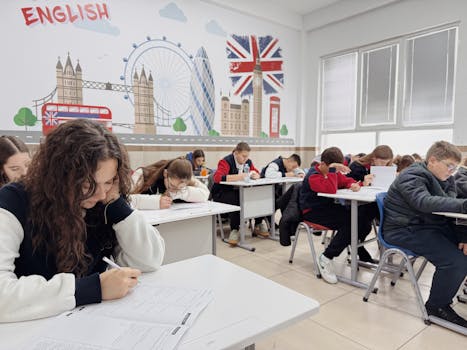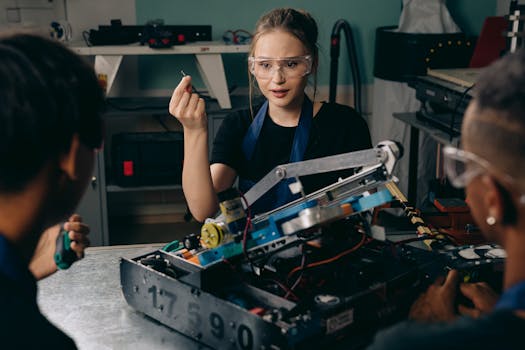Unveiling the Profound Capabilities Beyond the Classroom: A Special Education Teacher's Untapped Potential
From years spent orchestrating individualized learning journeys amid diverse educational needs and behavioral complexities, special education teachers emerge possessing an unparalleled skill set. Their mastery of personalized instruction isn't merely teaching; it's a finely honed art of performance optimization, a highly sought-after talent across numerous industries. Envision a virtuoso conductor leading a diverse symphony; each student is a unique instrument, requiring nuanced understanding to create a harmonious performance, even when dissonance arises or particular instruments demand specialized attention.
The capacity to deconstruct intricate concepts into digestible components is a remarkable attribute. This talent finds fertile ground in software engineering or project leadership, where intricate processes necessitate crystalline articulation and division into actionable phases. Creating effective training methodologies, designing user interfaces with accessibility in mind, or spearheading complex projects—these all benefit from this aptitude for transforming the convoluted into the comprehensible, reaching a broad spectrum of learners.
Moreover, special education teachers are experts in behavior management—not solely in the classroom, but in the intricate tapestry of human interaction. They possess an insightful understanding of the origins of challenging behaviors, coupled with inexhaustible patience and empathetic engagement to transform conflict into collaboration. This invaluable expertise proves instrumental in conflict resolution, human resources, social work, and even law enforcement. Their expertise resembles navigating a treacherous landscape, identifying and skillfully neutralizing potential hazards; a transferable skill set for demanding, potentially volatile environments.
Beyond these technical proficiencies, special education teachers embody remarkable resilience and adaptability. They routinely confront unexpected obstacles, navigate setbacks, and execute nimble, creative adjustments. These are precisely the traits that flourish in entrepreneurial enterprises, consulting, and other high-stakes environments demanding rapid problem-solving under pressure. It’s analogous to an experienced mariner weathering a tempest; they navigate the unpredictable turmoil while steadfastly pursuing their objective amidst the chaos.
The art of cultivating collaboration and forging robust relationships constitutes another cornerstone of their proficiency. In collaborative contexts, the ability to understand and connect with individuals from diverse backgrounds is paramount. This is akin to constructing a magnificent Lego edifice; each brick is distinct, and the teacher expertly integrates them, leveraging each piece's unique strengths, into a robust, aesthetically pleasing whole. This talent shines brightly in leadership roles, team-building initiatives, and collaborative project direction.
Finally, special education teachers exhibit exceptional emotional intelligence. They perceive and understand their students' emotional states, empathize with their challenges, and cultivate supportive learning environments that nurture both academic and socio-emotional growth. This profound empathy translates seamlessly into roles demanding navigating complex human interactions – from healthcare and social work to mediation and counseling. It’s the skill of comprehending the environment's emotional currents and responding appropriately; a critical, often undervalued skill, yet invaluable across a multitude of professions.
The untapped reservoir of talent within the special education profession demands our urgent attention; it’s far more than a mere career re-imagining. This isn't simply about facilitating professional metamorphosis; it's about amplifying a societal resonance profoundly underestimated. These dedicated educators, often relegated to the confines of traditional classrooms, possess a wealth of transferable skills frequently overlooked. Unveiling this latent potential unlocks a treasure trove of benefits, enriching diverse sectors and communities in unexpected ways—a veritable gold rush of human capital waiting to be mined.
Consider the transformative leadership potential these educators embody. Their peerless communication prowess and innate team-building aptitude could galvanize organizations, fostering a culture of inclusivity and inspiration. These individuals aren't merely teachers; they're architects of accessibility, constructing pathways for diverse populations to not only participate but flourish. Their remarkable adaptability and problem-solving acumen are invaluable assets for any enterprise navigating the complexities of the modern world.
Moreover, the profound emotional intelligence and empathetic nature of special education professionals are catalysts for a more humane and compassionate work culture. Their expertise in conflict resolution, collaborative cultivation, and rapport building across diverse groups is fundamental to creating psychologically secure and inclusive environments, transforming workplaces across numerous industries. This isn't just about improved productivity; it’s about creating environments where individuals truly thrive.
The potential for transformative innovation is equally compelling. Special education teachers are inherently ingenious, masters of crafting unconventional solutions to intricate pedagogical challenges. This innovative spirit, a wellspring of creative problem-solving, can invigorate various industries, challenging conventional wisdom and fostering disruptive approaches. It's a shot of pure, unadulterated creativity into systems often mired in routine and rigid standardization.
Therefore, mere acknowledgment of their value is insufficient; we must actively champion their transition into new roles. This necessitates a concerted effort: establishing robust mentorship frameworks, providing targeted professional development opportunities, and fostering expansive networking events that bridge the gap between these exceptional educators and diverse industries. This also demands a fundamental shift in societal perception, recognizing the expansive and transformative skill sets these educators possess. Empowering these dedicated individuals isn't simply an act of kindness; it's a strategic investment in the collective future, yielding substantial returns for both individual careers and the overall health of our society.
Let's finally cast aside the limiting paradigm of viewing special education teachers solely as classroom instructors. They are dynamic, highly adaptable professionals with expertise that transcends the four walls of a classroom. Let us equip them with the resources and recognition they deserve, enabling them to flourish in myriad roles and unleash their potential to positively impact our world. This isn't just about their futures; it's about the future of us all.






